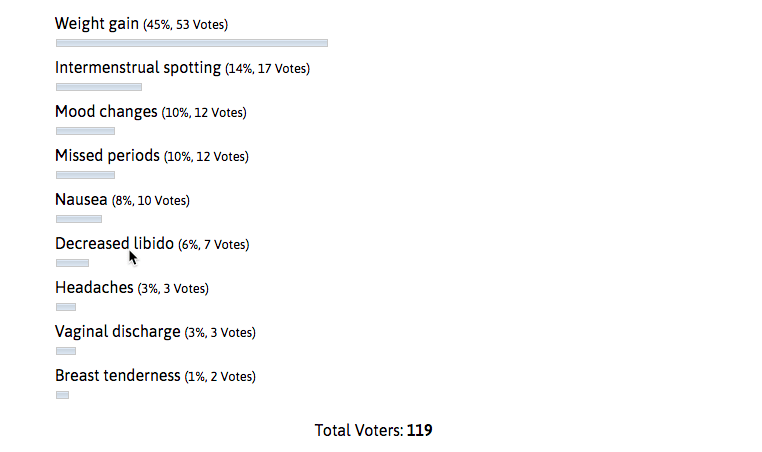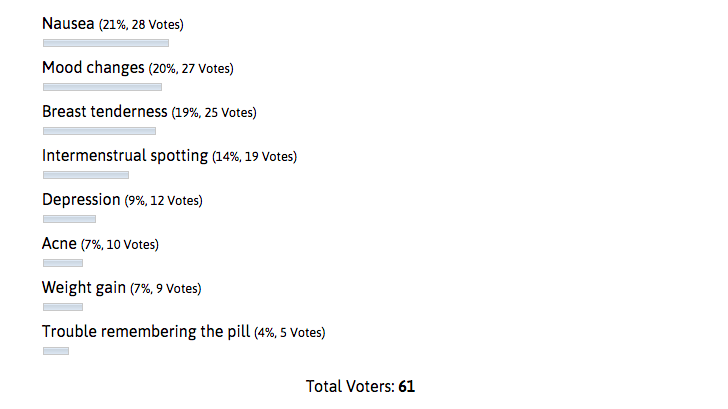What Is The Most Common Birth Control Pill Side Effect?

The oral contraceptive pill is a very effective form of birth control when taken at the same time every day. When taken completely (without the occasional omission), only 0.3% of women experience an unintended pregnancy. However, like any drug, it can also have side effects. We recently did two polls in which we asked about the most common side effects of the birth control pill.
Usually the side effects decrease with time but still, they worry people. In our polls, we want to dive into which ones are the most worried and which ones are experienced.
Almost half (45%) of users are concerned about possible weight gain during pill use. If it helps, clinical studies have found no consistent association between the use of birth control pills and weight fluctuations. Usually, weight changes occur due to other reasons or are temporary.

Quite consistent with this fact is that in our other survey we noticed only 7% of users experiencing weight gain. The most common side effect experienced was actually nausea (21%). Going back to the image above, only 8% of users are worried about experiencing this. It’s good to know that these symptoms usually subside after a short time. Taking the pill with food or at bedtime may also help reduce the likelihood of nausea.

(Note that for other surveys it is possible to give multiple answers, so the votes do not equal 61.)
If so, what about mood swings? At first, only 10% of people were concerned about mood swings. 20% of users reported experiencing these symptoms.
This side effect has been studied a lot. For example, a 2015 study of 90 women published in Human Mapping found that use of birth control pills was associated with smaller measures of cortical thickness in the lateral orbitofrontal cortex and the posterior cingulate cortex. Now that’s a mouthful…
What does this mean? These parts of the brain are associated with the reward response and evaluation of incoming stimuli, and this means that the pill can mess with how you feel about things.
No need to sound the panic alarm though. The authors noted that further research needs to be conducted to confirm whether there is a connection between cortical thinning in these areas of the brain, mood swings, and birth control pill use. In any case, anyone experiencing mood swings while using the pill should contact their medical provider.
It is important that anyone who experiences any of the following side effects while taking the pill contact their medical provider or visit an emergency room immediately, as they may indicate a serious condition.
Side effects of birth control pills that should be investigated are:
- A: Abdominal/abdominal pain
- C: Chest pain (as well as shortness of breath)
- H: Severe headache
- E: Eye problems such as blurred vision or vision loss
- S: Swelling or pain in the legs and thighs (including redness, swelling or pain in the calf or thigh).
These symptoms will be remembered using the acronym ACHES.
Related articles
Sources:
- Association of Reproductive Health Professionals, Health matters fact sheetaccessed August 20, 2015.
- Brown University, Birth control pills (BCPs)accessed February 27, 2015.
- Oral contraceptive pill use is associated with localized decreases in cortical thickness, Nicole Petersen et al., Mapping the Human Braindoi: 10.1002/hbm.22797, published online April 2, 2015, abstract.








